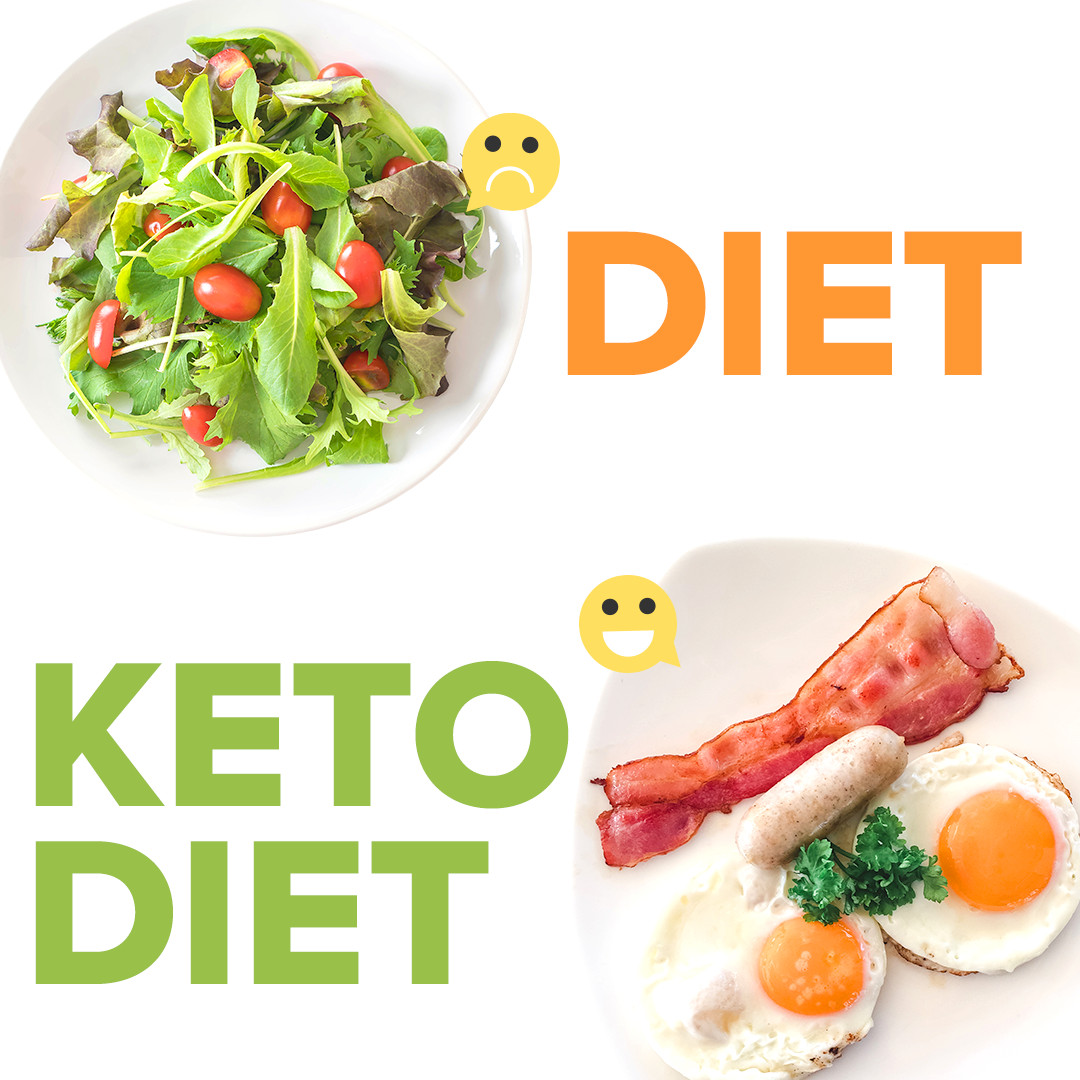Are You Right For The Keto Diet?
These days, it seems like everyone is talking about the ketogenic (in short, keto) diet - the very low-carbohydrate, moderate protein, a high-fat eating plan that transforms your body into a fat-burning machine. Hollywood stars and professional athletes have publicly touted this diet's benefits,
1- from losing weight,
2- lowering blood sugar,
3- fighting inflammation,
4- reducing cancer risk,
5- increasing energy, to slowing down aging.
So is keto something that you should consider taking on? The following will explain what this diet is all about, the pros and cons, as well as the problems to look out for.
What Is Keto?
A) Normally, the body uses glucose as the main source of fuel for energy. When you are on a keto diet and you are eating very few carbs with only moderate amounts of protein (excess protein can be converted to carbs), your body switches its fuel supply to run mostly on fat.
The liver produces ketones (a type of fatty acid) from fat. These ketones become a fuel source for the body, especially the brain which consumes plenty of energy and can run on either glucose or ketones.
B) When the body produces ketones, it enters a metabolic state called ketosis. Fasting is the easiest way to achieve ketosis. When you are fasting or eating very few carbs and only moderate amounts of protein, your body turns to burn stored fat for fuel. That is why people tend to lose more weight on the keto diet.
Benefits Of The Keto Diet
1) The keto diet is not new. It started being used in the 1920s as a medical therapy to treat epilepsy in children, but when anti-epileptic drugs came to the market, the diet fell into obscurity until recently.
2) Given its success in reducing the number of seizures in epileptic patients, more and more research is being done on the ability of the diet to treat a range of neurologic disorders and other types of chronic illnesses.
3) Neurodegenerative diseases. New research indicates the benefits of keto in Alzheimer's, Parkinson's, autism, and multiple sclerosis (MS). It may also be protective in traumatic brain injury and stroke.
4) One theory for keto's neuroprotective effects is that the ketones produced during ketosis provide additional fuel to brain cells, which may help those cells resist the damage from inflammation caused by these diseases.
5) Obesity and weight loss. If you are trying to lose weight, the keto diet is very effective as it helps to access and shed your body fat.
6) Constant hunger is the biggest issue when you try to lose weight. The keto diet helps avoid this problem because reducing carb consumption and increasing fat intake promote satiety, making it easier for people to adhere to the diet. In a study, obese test subjects lost double the amount of weight within 24 weeks going on a low-carb diet (20.7 lbs) compared to the group on a low-fat diet (10.5 lbs).
7) Type 2 diabetes. Apart from weight loss, the keto diet also helps enhance insulin sensitivity, which is ideal for anyone with type 2 diabetes. In a study published in Nutrition & Metabolism, researchers noted that diabetics who ate low-carb keto diets were able to significantly reduce their dependence on diabetes medication and may even reverse it eventually. Additionally, it improves other health markers such as lowering triglyceride and LDL (bad) cholesterol and raising HDL (good) cholesterol.
8)Cancer. Most people are not aware that cancer cells' main fuel is glucose. That means eating the right diet may help suppress cancer growth. Since the keto diet is very low in carbs, it deprives the cancer cells of their primary source of fuel, which is sugar.
9) When the body produces ketones, the healthy cells can use that as energy but not the cancer cells, so they are effectively being starved to death. As early as 1987, studies on keto diets have already demonstrated reduced tumor growth and improved survival for a number of cancers.
Comparing Standard American, Paleo, & Keto Diets
(As a % of total caloric intake)
__________________________Carbs__________Protein_________Fat
Standard American Diet_____40-60%_________15-30%_________15-40%
Paleo Diet_________________20-40%_________20-35%_________25-50%
Keo Diet________________ __5-10%__________10-15%_________70-80%
The key distinction between the keto diet and the standard American or Paleo diets is that it contains far fewer carbs and much more fat. The keto diet results in ketosis with circulating ketones ranging from 0.5-5.0 mM. This can be measured using a home blood ketone monitor with ketone test strips. (Please know that testing ketones in the urine are not accurate.)
Keto is everywhere; it's the new buzzword, the new favorite among those looking to shed pounds, and the new hate victim of the food-pyramid-spouting-eat-your-whole grains mainstream medical industry. The keto diet, while it is not the magic cure-all for every single disease on the planet, does a pretty dang good job at being the potential causer of healing many horrible conditions. So let's cut through the science, separate fact from fiction, and look at the benefits of the keto diet.
Benefit #1: Weight Loss
Okay, so this one isn't so astounding, but it is one of the most common reasons people embark on the keto diet. So why is weight loss usually so easy on the ketogenic diet instead of other regular diets? For all of the following reasons:
• The keto diet is composed of approximately 75% fat, 20 % protein, and 5% or fewer carbohydrates. The high-fat content and lack of sugar mean diminished cravings, lack of blood sugar swings and binges, and increased satiation. Increased satiation=eating less. Many people also have food sensitivities to grains, even gluten-free ones, so eliminating them may lead to an increased ability to absorb minerals like magnesium and potassium, which in turn means your body is more nourished and you have fewer cravings
• Ketones. When your blood sugar is running low, your body turns to its glycogen stores for energy. Typically glycogen stores house about 2000 calories of "backup" energy for when you run out of glucose. Like the intelligent machine it is, your body depletes the glycogen stores and then turns to your own body fat for fuel.
The ketogenic diet is not a free-for-all eat however much cheese or super low-carb fat bomb treats you want to diet. If you are eating way more calories than you need, you will not lose weight. So focus on keeping your diet around fatty cuts of grass-fed meat, butter, eggs, avocados, lots of green veggies, and cruciferous, and be modest with the keto desserts, dairy, and sweets.
Benefit #2: Brain Function
A poorly functioning brain, as you may have already experienced, leads to lessened work productivity, which in turn means an unhappy boss, lack of job satisfaction, sugar cravings for energy, and depression. It's a horrible domino effect. The original ketogenic diet was formulated by Dr. Russell Wilder in the early 20th century to treat epilepsy. The success rate was phenomenal and it is still used today to treat epilepsy and other brain disorders. Research also indicates that ketones are a more efficient brain fuel than glucose. (Source:https://www.ncbi.nlm.nih.gov/pmc/articles/PMC5102124/)
Benefit #3: Potential Cancer Benefits
One study showed implementing the ketogenic diet led to a dramatically increased survival time and slower tumor growth. (Source: https://www.ncbi.nlm.nih.gov/pmc/articles/PMC5450454/)
>>>>>>Click here to learn More<<<<<<
Important Disclaimer:
Articles provided are for general information purposes only and are not intended to substitute for informed professional medical, psychological, tax, accounting, legal, investment, or any other professional advice.
Source / Agency











Post a Comment